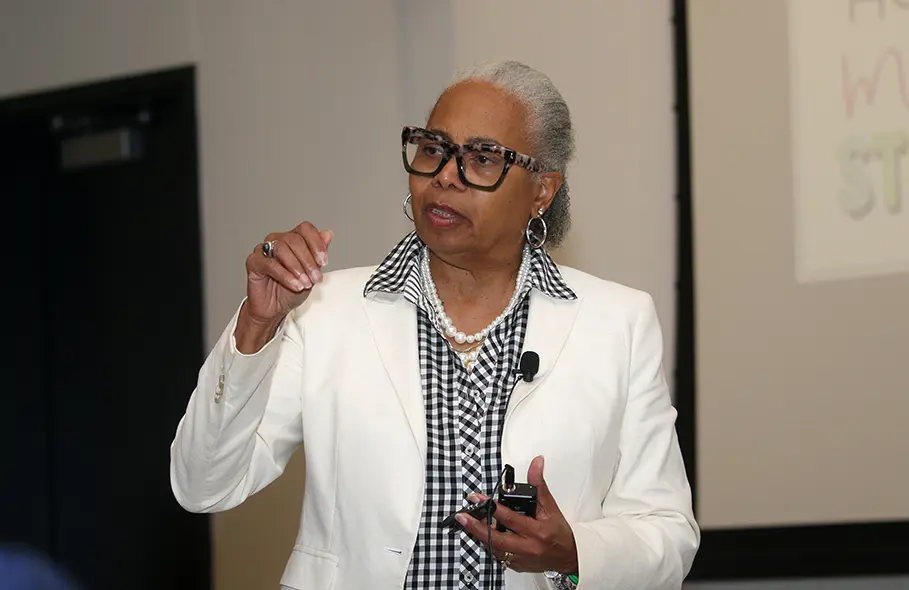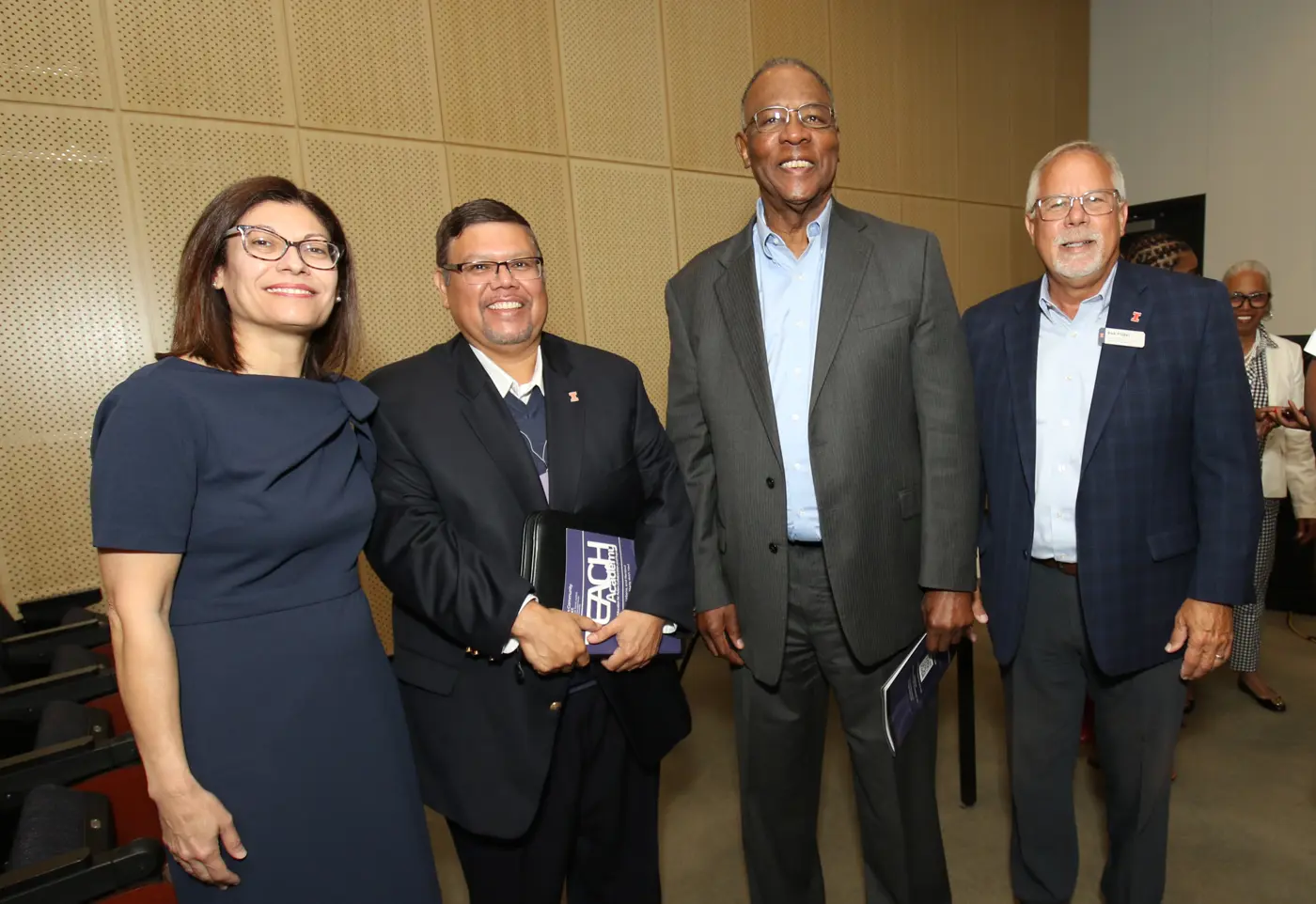Building a Community of Educators to Address Systemic Racism and Social Injustice
by Tom Hanlon / Oct 9, 2024

The TEACH Academy, a three-day, power-packed conference, allows local educators to grow and invest in their—and their students ’—future.
Quick Take
- 180 local teachers attend conference to reimagine their professional practice and build on their strengths
- The conference addresses systemic racism and social injustice in education
- Attendees benefit from working throughout the year with teacher collaborators
“I feel refreshed and inspired, reminded about my identity as a professional and not just as an employee of an institution.”
“I loved connecting with people of my past and present but also engaging with new people to reset the future.”
“We need to treasure ourselves, treasure our colleagues, and treasure our students.”
Investing in the Lives of Local Teachers
The quotes above are just three of the many comments shared by participants in the second annual TEACH Academy, offered through the Center for Education in Small Urban Communities (CESUC) and held on the University of Illinois Urbana-Champaign campus over three days this past July.
In Chancellor Robert J. Jones’ letter welcoming this year’s participants, the chancellor noted that the academy, sponsored by the Campus Community Compact to Accelerate Social Justice, “seeks to address systemic racism and social injustice by investing in the lives of our local teachers, children, and communities.” Jones wrote that the newfound knowledge implemented by last year’s participants “resulted in preliminary improvement, especially on Algebra 1 test scores.”
Building a Community of Educator
 Victor Perez is the director of CESUC and a lead member of the TEACH Academy planning committee. TEACH stands for Transforming Education for Action, Collaboration, and Hope.
Victor Perez is the director of CESUC and a lead member of the TEACH Academy planning committee. TEACH stands for Transforming Education for Action, Collaboration, and Hope.
“The academy places a heavy emphasis on differentiation with equity and inclusion serving as one of the core tenants of professional development,” he says. “We are building a community of educators that actively engage in reflective practices grounded in research. Teachers benefit from modeling, co-teaching, coaching, and collaborating with other educators and experts.”
A Place for Educators to Grow
Perez says that the TEACH Academy addresses the needs of students, particularly those from historically marginalized groups. “These students often lack the access and opportunities to learning designed to promote academic success and critical consciousness,” he says.
Over the years, Perez adds, the academy has helped bridge the gap between researcher and practitioner. “It is one of many outreach efforts that help bond the University of Illinois to the local community,” he notes. “There is a strong desire for teachers to access a space where they can reimagine their professional practice and build on their strengths. The TEACH Academy offers a place for educators to grow.”
Growing and Successful
In 2023, the first year of the conference, 90 local teachers attended. This year, 180 descended on campus to learn how to promote equity and inclusion in the classroom through data-driven decision-making to change outcomes. Fifty-five TEACH scholars returned for this year’s conference—and 94% of this year’s attendees plan to return for next year’s conference, says Perez.
“Ninety-eight percent of the TEACH scholars felt that our event addressed instructional strategies surrounding educational justice, equity, and inclusion,” he says. “Ninety-six percent felt our event met their expectations.”
Those expectations were met in part through the presentations of each day’s keynote speakers. Gloria Ladson-Billings, professor emeritus at the University of Wisconsin-Madison, spoke on “Justice Matters”; Chase Orton, president of Mobius Educational Consulting, presented on “Moving Toward a Thinking Classroom”; and Dr. Jimmy Moss, author, physician, and motivational speaker, shared his experiences through “A Doctored Life: From Homeless to Harvard.”
Treating Teachers Like the Professionals They Are
Attendees chose between two strands. Both focused on the “Building Thinking Classrooms” instructional framework, which is based on the work of Peter Liljedahl, a professor of mathematics education at Simon Fraser University in Vancouver, Canada. One strand focused on building thinking classrooms in mathematics, while the other explored how to adapt the framework in literacy classrooms.
“The academy is a high-quality professional experience designed to empower local educators,” Perez says. “The TEACH scholars are provided an opportunity to engage with exceptional leaders in the education field and develop the tools needed to implement new ideas and frameworks. Treating teachers like the professionals they are is very important and something the academy does exceptionally well.”
Teacher Collaborator Project Extends Benefits
The benefits of TEACH Academy extend far beyond the three-day conference through the work of teacher collaborators who work throughout the year with the local educators, supporting them in math, literacy, and bilingual education. These teacher collaborators, employed by the Center for Education in Small Urban Communities, are Brad Thompson, Jill DeHart, Tara Lash, and Maria Lang.
“They work with the educators by observing classrooms, sharing research, co-planning, teaching side by side, modeling instructional practices, and facilitating teacher inquiry groups,” Perez explains. “Since 2007, the Teacher Collaborator Project has provided research-based professional development partnerships with Urbana and Champaign teachers.”
One of CESUC’s primary goals is to model school-based learning using a continuous improvement model. The model provides:
- Ongoing opportunities for intensive, collaborative professional learning;
- in-depth focus on academic subject matter to address teaching/learning gaps and high-leverage teaching practices that facilitate specific learning;
- short cycles of instructional coaching for additional support and
- data for teachers to document evidence of classroom improvement.
TEACH Academy, a three-day, power-packed conference, offers local educators the opportunity to grow and invest in their—and their students’—future.